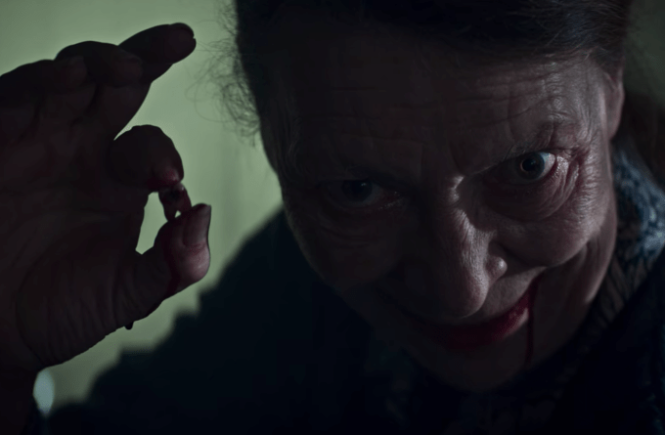I have a deep affection for horror stories that can tackle serious emotional, historical and/or socio-political topics with intelligence and thoughtfulness. I have all the love in the world for more nuanced, patient, and layered horror fiction. Recent stories like The Babadook or The Witch, or one of my personal favorite horror films, A Tale of Two Sisters, come to mind. I can watch those movies again and again throughout most of the year.
Not so much, however, when it’s Halloween season.
Not that I’m looking to “dumb it down” for Halloween. A lazy, witlessly stupid film is always going to be a tough sell for me. I’m just more in the mood for something like the French series Marianne, a story about a famous horror author whose fiction is inspired by nightmares that are more rooted in reality than she wants to admit, until she’s forced to.
It’s a story about witchcraft in Europe that doesn’t have anything to say about the horrid crimes committed against the many people falsely accused of witchcraft in centuries past. It’s a story about a probable-alcoholic with a troubled past that doesn’t have anything deep to say about substance abuse or childhood trauma. In fact, the childhood trauma itself is ultimately revealed to be a perfect bit of horror-whimsy. Something that would happen to a child in a story told by a campfire.
Marianne is not aspiring to be a “meaningful” horror story, just a good one. There’ll always be a place for such stories alongside the ones that actually have a statement to make. Particularly at this time of year.
Of course, execution is paramount in all cases, and Marianne‘s execution is what truly won my heart. Marianne is indulgent, but not too much. It’s like a grandmother that will make your favorites for breakfast, lunch and dinner, but won’t let you snack between meals, lest you spoil your appetite. Director Samuel Bodin (with an assist from co-writer Quoc Dang Tran) manage to be generous with the jump scares, for instance, but do not overdo them. In fact, in many instances they withhold the expected scare entirely and don’t try to play the silly “fake-scare / real-scare / gotcha!” game so many lesser filmmakers can’t help but partake in.
This series, like the best of other expertly indulgent directors such as James Wan and John Carpenter, feels like it was made by someone who expects the audience to have seen their share of horror stories already. They’re going to give the viewer what they tuned in for, but at their own pace, in their signature way, and on their own schedule.
I’m not aware of any other work Samuel Bodin has done, but he comes across as a student-turned-professor of the genre. Marianne pays homage to signature moments from The Omen, Exorcist III, and many others. It has “blink and you’ll miss ’em” flashes of frightfulness and lingering looks into shadows that force you to inspect the dark to be sure that the outline you think you see is really there. It has moments of slow, creeping dread and glorious, darkly Baroque-yet-Romantic, “my God I wish I could see this on the big screen” capital-H Horror. The series is bookended by such moments: a perfectly executed moment of unstoppable dread early in the first episode (the fact that it’s telegraphed just makes its inevitability more impactful), and a moment in the climax of the finale that I wish I could summon Fuseli to paint for me. Both scenes left me grinning like a delighted child.
I did worry somewhere in the midst of episode six that the series was losing steam and would putter to the finish line. I was happy to be wrong about this. While the momentum did slow down for a moment, it rebounded excellently toward the end. The finale manages to be both a fitting conclusion and a fitting cliffhanger. It wraps the current story effectively for any who are satisfied enough with what they’ve seen to leave it as is. It introduces a new direction for a follow-up season for any who are still craving more.
It’s not quite a perfect piece of storytelling. Most blatantly, it falls into a trap that many horror stories fall into: it can’t logically account for the lack of a greater police response to the multiple disappearances and deaths occurring, so it barely even tries. This is normally less of an issue in a story such as this, where almost everything takes place in a small, fairly isolated town. Usually such locations in horror stories only have a small local police force (perhaps as small as just one person) who is hopelessly overwhelmed and never has the chance or inclination to seek outside help, or is under the influence of the supernatural force behind all of the horror. Here, though, the lead detective comes in from out of town. He never reports back anything he’s seen as the days go by? He never asks for or receives any assistance after multiple murders and inexplicable disappearances have occurred? Are French police just that laissez-faire? By the eighth and final episode all of this gets a little more difficult to overlook. But I know this isn’t something that crosses the minds of many viewers.
Other than the above paragraph, I have very little negative to say about Marianne. Perhaps on second watch I’ll find some more things to be critical about. Not enough of them to outweigh the things I loved, however, I’m sure. As for now, a second watch is guaranteed. As is often the case, my only regret is that I can’t watch it in a darkened theater on a giant screen. It has earned a place on my Required Viewing List for every October to come.

